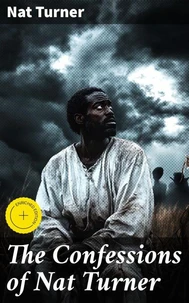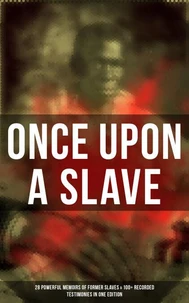The Confessions of Nat Turner
Par :Formats :
Disponible dans votre compte client Decitre ou Furet du Nord dès validation de votre commande. Le format ePub est :
- Compatible avec une lecture sur My Vivlio (smartphone, tablette, ordinateur)
- Compatible avec une lecture sur liseuses Vivlio
- Pour les liseuses autres que Vivlio, vous devez utiliser le logiciel Adobe Digital Edition. Non compatible avec la lecture sur les liseuses Kindle, Remarkable et Sony
 , qui est-ce ?
, qui est-ce ?Notre partenaire de plateforme de lecture numérique où vous retrouverez l'ensemble de vos ebooks gratuitement
Pour en savoir plus sur nos ebooks, consultez notre aide en ligne ici
- Nombre de pages22
- FormatePub
- ISBN859-65--4717225-3
- EAN8596547172253
- Date de parution15/08/2022
- Protection num.Digital Watermarking
- Taille489 Ko
- Infos supplémentairesepub
- ÉditeurDIGICAT
Résumé
In "The Confessions of Nat Turner, " the infamous leader of the 1831 slave rebellion presents a chilling and profound account of his life and motivations. This narrative intricately weaves together personal reflections, spiritual devotion, and fervent political ideology, offering insights into the psychological turmoil and existential crises faced by enslaved individuals. The book employs a poignant and evocative literary style, capturing both the visceral agony of bondage and the simmering desire for freedom through powerful imagery and rhythmic prose, reflective of the oral traditions of African American culture.
Turner's confessions are set against the backdrop of America's antebellum society, amplifying its themes of racial conflict and moral reckoning within a historical moment of deep socio-political strife. Nat Turner was born into slavery in Virginia in 1800, and his religious fervor and experiences of oppression fueled his revolutionary spirit. Educated and deeply influenced by the Biblical narratives of liberation, Turner believed he was divinely chosen to lead his people out of slavery.
His ultimate uprising, although met with brutal suppression, has become a symbol of resistance and a critical turning point in the national consciousness regarding slavery and human rights. This essential text is not only an autobiographical confession but also a compelling historical document that invites readers to grapple with the complexities of moral choice and the quest for justice. Recommended for scholars, historians, and anyone seeking to understand the enduring legacies of oppression and rebellion, Turner's confessions resonate powerfully in discussions about freedom, faith, and the fundamental struggle for human rights.
Turner's confessions are set against the backdrop of America's antebellum society, amplifying its themes of racial conflict and moral reckoning within a historical moment of deep socio-political strife. Nat Turner was born into slavery in Virginia in 1800, and his religious fervor and experiences of oppression fueled his revolutionary spirit. Educated and deeply influenced by the Biblical narratives of liberation, Turner believed he was divinely chosen to lead his people out of slavery.
His ultimate uprising, although met with brutal suppression, has become a symbol of resistance and a critical turning point in the national consciousness regarding slavery and human rights. This essential text is not only an autobiographical confession but also a compelling historical document that invites readers to grapple with the complexities of moral choice and the quest for justice. Recommended for scholars, historians, and anyone seeking to understand the enduring legacies of oppression and rebellion, Turner's confessions resonate powerfully in discussions about freedom, faith, and the fundamental struggle for human rights.
In "The Confessions of Nat Turner, " the infamous leader of the 1831 slave rebellion presents a chilling and profound account of his life and motivations. This narrative intricately weaves together personal reflections, spiritual devotion, and fervent political ideology, offering insights into the psychological turmoil and existential crises faced by enslaved individuals. The book employs a poignant and evocative literary style, capturing both the visceral agony of bondage and the simmering desire for freedom through powerful imagery and rhythmic prose, reflective of the oral traditions of African American culture.
Turner's confessions are set against the backdrop of America's antebellum society, amplifying its themes of racial conflict and moral reckoning within a historical moment of deep socio-political strife. Nat Turner was born into slavery in Virginia in 1800, and his religious fervor and experiences of oppression fueled his revolutionary spirit. Educated and deeply influenced by the Biblical narratives of liberation, Turner believed he was divinely chosen to lead his people out of slavery.
His ultimate uprising, although met with brutal suppression, has become a symbol of resistance and a critical turning point in the national consciousness regarding slavery and human rights. This essential text is not only an autobiographical confession but also a compelling historical document that invites readers to grapple with the complexities of moral choice and the quest for justice. Recommended for scholars, historians, and anyone seeking to understand the enduring legacies of oppression and rebellion, Turner's confessions resonate powerfully in discussions about freedom, faith, and the fundamental struggle for human rights.
Turner's confessions are set against the backdrop of America's antebellum society, amplifying its themes of racial conflict and moral reckoning within a historical moment of deep socio-political strife. Nat Turner was born into slavery in Virginia in 1800, and his religious fervor and experiences of oppression fueled his revolutionary spirit. Educated and deeply influenced by the Biblical narratives of liberation, Turner believed he was divinely chosen to lead his people out of slavery.
His ultimate uprising, although met with brutal suppression, has become a symbol of resistance and a critical turning point in the national consciousness regarding slavery and human rights. This essential text is not only an autobiographical confession but also a compelling historical document that invites readers to grapple with the complexities of moral choice and the quest for justice. Recommended for scholars, historians, and anyone seeking to understand the enduring legacies of oppression and rebellion, Turner's confessions resonate powerfully in discussions about freedom, faith, and the fundamental struggle for human rights.






